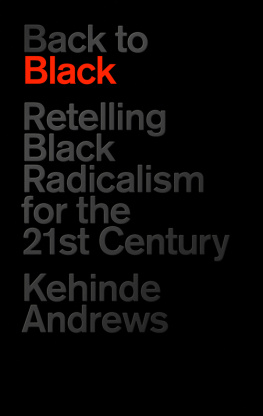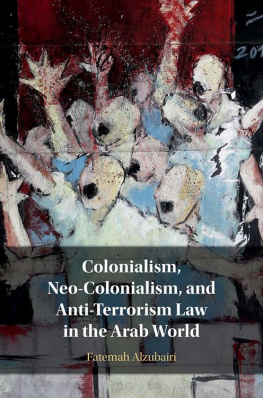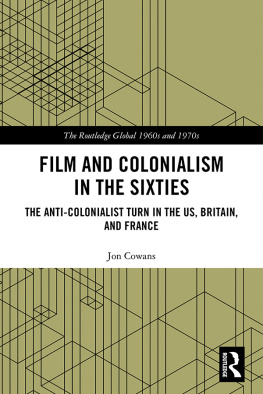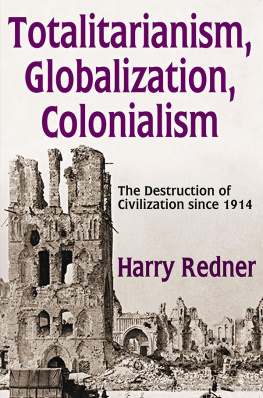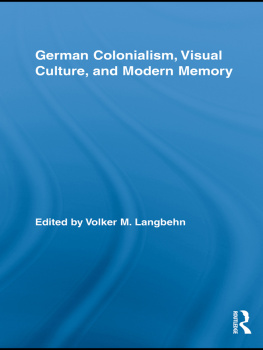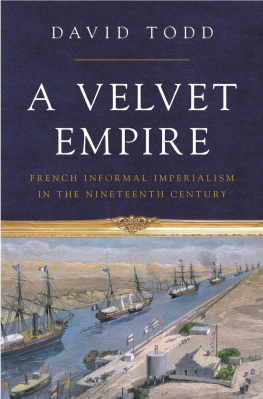

Kehinde Andrews
The New Age of Empire
How Racism and Colonialism Still Rule the World

Contents
About the Author
Dr. Kehinde Andrews is Associate Professor in Sociology at the School of Social Sciences at Birmingham City University and developed the Europe s first Black Studies undergraduate degree. He is also director of the Centre for Critical Social Research, founder of the Harambee Organisation of Black Unity, and co-chair of the Black Studies Association.
For Assata, Kadiri, Omaje and Ajani
Foreword
Racism Is a Matter of Life and Death
Witnessing the police killing George Floyd in May 2020 was the straw that broke the camels back, coming so close on the heels of the lynching of Ahmaud Arbery and state-sanctioned murder of Breonna Taylor. A wave of protest and rebellion was unleashed onto the streets in the United States, reminiscent of the hot summers of the 1960s, when racial tensions exploded and cities burned. Millions of people across the world joined the movement, protesting the experiences of racism that are all too common. Black Lives Matter came into vogue and was adopted by media companies, major corporations and even national governments. An optimism has been felt, that society is now ready to face up to the realities of racism. But rather than celebrating the new-found enthusiasm for talking about racism, we should approach with extreme caution. Unilever and LOral loudly trumpeting that they were removing the word fair from their skin-lightening products is the perfect metaphor for the meaningless change being offered in response to the moment. Rebranding a racist product is not a step in the right direction, it is a kick in the teeth to all those who suffer the impacts of White supremacy. We entirely miss the point if we believe that racism can be overcome with token gestures, commitment to diverse hiring practices or statements of brand solidarity. It is not mere coincidence that the latest wave of protests took hold during the lockdowns for the Covid-19 pandemic. The cynic in me will always be convinced that the lack of other news and places to go was a major factor in the mainstreaming of racial justice. We saw the exact same responses to the murders of Alton Sterling and Philando Castile in 2016 from Black communities across the globe, which somehow failed to grasp the attention of the Whiter wider public. But by the time the protests kicked off, the pandemic itself had already exposed the racism underpinning society.
Covid-19 tore through the West so completely that there were discussion about whether the virus was the great leveller of conditions in society. When British Prime Minister Boris Johnson was hospitalized with the virus, we were reminded that no one was safe. Donald Trump, the most unlikely president of the United States, started taking the anti-malarial drug hydroxychloroquine, later proved to be ineffective, in an effort to protect himself. Facing the impending loss of tens of thousands of lives, nations went into unprecedented lockdowns, and even the most right-wing, neoliberal governments provided economic safety nets for families and business that would have won the approval of Marx. But the delusions of all being in it together, or that viruses do not discriminate, quickly fell apart as the evidence began to show that Covid-19 simply laid bare existing social inequalities. The poor, the vulnerable and ethnic minorities were all shown to be far more likely both to catch the virus and to die from it, in Britain and the United States. The surprise at these findings tells us just how little we understand racism, which is not about personal prejudice, but rather is a matter of life or death. Covid-19 targeted ethnic minorities, thanks in part to our heavy concentration in the inner cities; disproportionate rates of poverty; and over-representation in the ranks of key workers. The brutal and uncomfortable truth is that racism takes years off a life and the ability to enjoy it. But the racial fault lines in the developed world are minor cracks compared to the devastating chasms of the value of life across the globe, and the response to Covid-19 reveals the logics of empire that continue to govern the world.
When the West was threatened with a staggering death toll, it was remarkable to see how quickly investment in and the development of a vaccine occurred. A vaccine within a year of the virus appearing would previously have been truly unprecedented but has been willed into existence. Malaria has existed for over a hundred years and claims the lives of 400,000 children annually, but there is still no reliable vaccination. If those children were dying in Europe, rather than Africa, the political will would have existed to find a cure. We saw the speed with which a vaccine was developed for Ebola once the disease left Africa and arrived in the United States. Even illnesses for which there are vaccines, that have been all but eradicated in the West, still claim lives in the Rest. Tuberculosis kills 1.5 million people annually. The primary logic underpinning the Western world order is that Black and Brown life is worth less.
The Covid-19 death toll will pale into insignificance compared to the loss of life annually due to poverty. Nine million people die around the world each year due to hunger. A child dies every ten seconds because they do not have access to food and water. These lives are almost exclusively Black and Brown. One of the main reasons that Covid-19 was not as devastating in Africa is because there are far fewer old people, because they die younger. In Nigeria, which has the largest population on the continent, only 2.5 per cent are over sixty-five, compared to over 15 per cent of the United States. In South Africa, one of the supposed success stories of the continent, more people die each year in the 3034 age bracket than the 8084 range. Such a figure is unimaginable in the nations former colonial ruler, Britain, where there are almost fifty times as many fatalities in the older age group. A virus that mainly kills old people was never going to be as much of a problem for a region whose life expectancy has just crept above sixty. Covid-19 brought the fear of life and death into the West that is the daily experience of billions around the globe.
For all the so-called aid dumped into the underdeveloped world, the problems of poverty remain entrenched. The majority of the progress of the much-lauded United Nations Development Goals, which sought to reduce world poverty by 2015, has been because of Chinas success. We still live in a world where a family of four, including children, farming tobacco leaves in Malawi for multinational corporation British American Tobacco can expect to earn 140 for a whole year. These kinds of conditions are just as prevalent in the majority of the world, where people live in levels of poverty that we in the West can only imagine. Were so used to this reality that we forget it is no historical accident. There is a reason and a logic behind global poverty. Although you would never guess it from the analysis of the United Nations (UN), World Bank, International Monetary Fund (IMF) or Western governments, racism still governs the entire political and economic system. Truly addressing this inequality cannot be done without a transfer of wealth and resources that would be transformative to the West. As long as we delude ourselves with rebranding and tinkering at the margins we will never be able to address the issue of racism.
Next page

